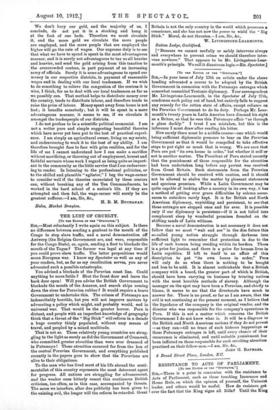pre, THE EDITOR 07 THE "SPECTATOR. " ] SIN,—In your issue of
July 13th an article under the above heading advocated a course to be adopted by the British
Government in connexion with the Putumayo outrages which somewhat resembled Teutonic diplomacy. Your correspondent Mr. Livingstone-Learmonth, in the Spectator of July 27th, condemns such policy out of hand, but entirely fails to suggest any remedy for the rotten state of affairs, except reliance on the Peruvian Government to do its duty. Perhaps Mr. Lear.
month's twenty years in Latin America have dimmed his sight as a Briton, so that he sees this Putumayo affair "as through a glass darkly." I trust I am mistaken, but this is the inference I must draw after reading his letter.
Now surely there must be a middle course—one which would bring sufficient diplomatic pressure to bear on the Peruvian Government so that it would be compelled to take effective steps to put right so much that is wrong. We are sure that Peru can put " its own house in order," but whether it will or not is another matter. The President of Peru stated recently that the punishment of those responsible for the atrocities had been undertaken long before any protest was received from Great Britain. Such statements from the Peruvian Government should be received with caution, and it should not be allowed to shelve the matter by pleasant statements and specious promises. While a Latin Government may be quite capable of looking after a country in its own way, it has a method of getting over grave difficulties by solemn assur- ances to outsiders rarely kept. It is for British and North American diplomacy, unyielding and persistent, to see that these outrages are stopped once and for ever. It is possible only if our diplomacy is persistent—if it is not lulled into complacent sleep by wonderful promises founded on tilt shifting sands of Latin wiliness.
Because a naval demonstration is not necessary it does not follow that we must "wait and see" in the dim future this so-called young nation struggle through darkness into sufficient light to remember that protection is due to the life of each human being residing within its borders. There is a price for justice, and there is a price for human lives in Latin republics. If left to itself in an affair of this description to put "its own house in order," Peru will only do so when there is nothing to be bought and less to be sold. It is almost unthinkable that a British company with a board, the greater part of which is British, should have been carrying on business by treating natives with the most horrible methods of slavery. Although the manager on the spot may have been a Peruvian, and chiefly to blame, it seems to me that the directorate have much to answer for. There is no proof, so far as I am aware, that the evil is not continuing at the present moment, as I believe that the liquidator of the company is the original vendor, and the director who was responsible for the company's operations in Peru. If this is not a matter which concerns the British Government I do not know what is. It will be a disgrace to the British and North American nations if they do not persist —as they can—till no trace of such hideous happenings as these Putumayo outrages is left, until every chance of their recurrence is eliminated, and until suitable punishment has been inflicted on those responsible for such revolting atrocities practised on their fellow-men.—I am, Sir, &c., 6 Broad Street Place, London, E.C. Jour/ G. RerHazi..


































 Previous page
Previous page